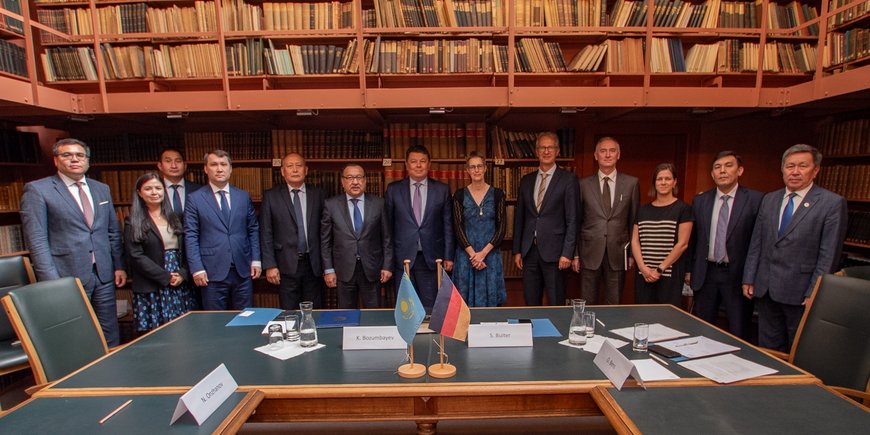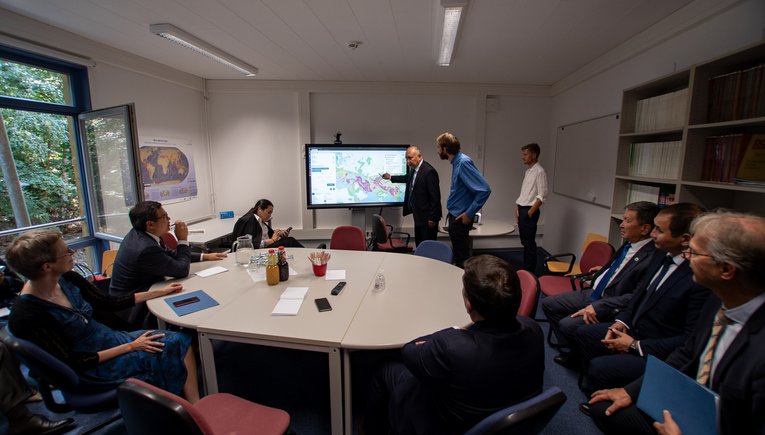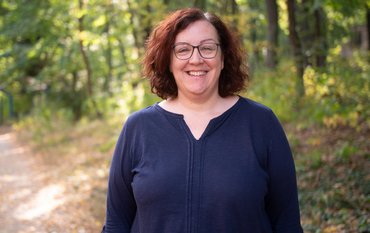On 23.08.2024, the Deputy Prime Minister of Kazakhstan, Kanat Bozumbayev, visited the GFZ German Research Centre for Geosciences in Potsdam. He and his high-ranking delegation were welcomed and received by the Scientific Director of the GFZ, Prof Dr Susanne Buiter. The Deputy Prime Minister was accompanied by the Ambassador of the Republic of Kazakhstan to Germany, H.E. Nurlan Onzhanov, the Deputy Minister for Water Resources and Irrigation, Bolat Bekniyaz, the Deputy Minister for Ecology and Natural Resources, Mansur Oshurbayev, and the Director General of the Institute of Water Resources Management, Nurlan Balgabayev.
The visit took place within the framework of the GFZ's long-standing cooperation and activities in the Central Asia region, in particular in connection with the GFZ's work on the Global Change Observatory Central Asia and within the framework of the Central Asian Institute for Applied Geosciences, CAIAG. The exchange served to intensify cooperation in the areas of research, transfer and training.
Focus on natural hazards and the protection of the population
At the request of Deputy Prime Minister Bozumbayev, natural hazards and options for protecting the population from the associated negative effects were a focal point of the exchange. Of particular interest was the threat posed to the region by floods and earthquakes, not least because Kazakhstan has already been affected by severe flooding and a series of earthquakes in the south of the country this year. Another focus was on ways of adapting to the consequences of climate change, especially in the area of water management in Central Asia.
The exchange topics in detail
After the welcome address by GFZ Executive Director Prof Susanne Buiter, Dr Oliver Bens, Head of Operational Management at the GFZ and Co-Director of the Central Asian Institute for Applied Geosciences, gave an overview of the work of this institute and the Central Asian research carried out by the GFZ in close cooperation with local research institutions for over twenty years. Dr Milena Latinovic, post-doctoral scientist in the GFZ Hydrology Section, presented the CAWa Green project, which deals with hydrological monitoring, modern modelling approaches and forecasting, among other things. It is part of the ‘Green Central Asia Initiative’ funded by the German Federal Foreign Office, which aims to contribute to a solid scientific and reliable regional data basis for the development of sustainable water management strategies in Central Asia. This is because Central Asia – exacerbated by climate change – is not only facing major water-related challenges in terms of natural disasters, but also in terms of water scarcity, deteriorating water quality and inefficient water utilisation.
The subsequent exchange meeting served, among other things, to coordinate even closer future cooperation in the field of training. The Kazakh government explained its plans to establish a national university for water management and landscape water management in the city of Taras in southern Kazakhstan. The consequences of the recent floods, which were unprecedented in their intensity in the last 80 years, have shown that innovative approaches are needed to cope with and prevent such disasters in the future. The representatives of the Kazakh government and its specialised authorities showed great interest in the methodological expertise of the GFZ and its knowledge of the Central Asian region. In this context, prospects for expanding cooperation with the Institute of Water Resources and for integrating the German-Kazakh University (DKU) in Almaty, the Kazakh National Agricultural Research University (KazNARU, Almaty) and the State Agency for Meteorology and Hydrology (KazHydroMet) were also discussed.
Visit to the GEOFON headquarters
Finally, the delegation visited the GEOFON headquarters. The GEOFON programme comprises a global seismic network, a seismological data centre and a global earthquake monitoring system and thus promotes international cooperation in seismology. GEOFON offers freely accessible real-time seismic data, access to in-house and external archive data, as well as fast and worldwide earthquake information and software development.
Prof Dr Frederik Tilmann, Head of the Seismology Section, presented the GFZ's contributions to global earthquake monitoring, with a focus on Central Asia. Dr Marco Pilz, scientist in the Seismic Hazards and Dynamic Risks Section, gave an overview of the possibilities for earthquake monitoring in Central Asia and provided information specifically on options for the regions in southern Kazakhstan.












![[Translate to English:] [Translate to English:] Abror Gafurov von dem Schriftzug "Welcome to Azerbaijan" und den UN und COP Logos](/fileadmin/_processed_/2/5/csm_2024_11_Baku_COP29_Abror_Gafurov_1042faec82.jpeg)


![[Translate to English:] Martin Herold standing in front of the library on the Telegrafenberg](/fileadmin/_processed_/c/d/csm_Martin_Herold_d385ee4dd9.jpeg)
![[Translate to English:] Many people are listening to a presentation in the GFZ lecture hall.](/fileadmin/_processed_/c/a/csm_1_Bild1_hell_b9c0e9f5ed.jpeg)






![[Translate to English:] Both scientists sitting on stools in front of a wall of books in the Telegrafenberg library](/fileadmin/_processed_/6/6/csm_Buiter_Castell_DORA_4_e87cb1ea18.jpeg)
![[Translate to English:] Gruppenbild mit 4 Personen](/fileadmin/_processed_/8/d/csm_20241017_GFZ-Emmerman-Medal-005_web_reinhardtundsommer_21a414fa4a.jpeg)






![[Translate to English:] Ice landscape with five red tents](/fileadmin/_processed_/8/9/csm_Zeltlager_auf_dem_Eis_Urheberin_Jenine_McCutcheon_5ced2d523b.jpeg)


